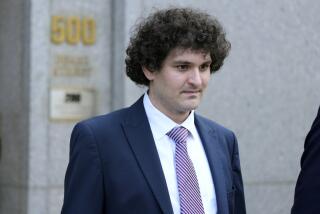THE DREXEL AGREEMENT TO SETTLE : Commentary : The Real Cost of Fraud: Jobs of Average Worker
- Share via
What does it say to the ordinary person that Drexel Burnham Lambert has agreed to plead guilty to securities fraud?
It proclaims resoundingly that some hefty part of the financial atmosphere of the 1980s, so dominated by corporate finance and mergers and acquisitions, has been based on lies and fraud.
Because of sharp and dishonest dealing, ordinary people have lost their jobs and enormous changes have come to work and industry in America. That’s what the Drexel news on Wednesday means.
It’s not a thought that often occurs to most people. In effect, they agree with the juror who was seen nodding off during the start of a major securities fraud trial in New York on Wednesday. The courtroom was hot and stuffy, to be sure. But let’s face it, most people don’t feel victimized by insider trading or big-time securities manipulation.
When they hear that Drexel Burnham has agreed to plead guilty to six felony counts of securities fraud and pay $650 million in damages, most people feel that it’s interesting--especially the money--but not something that touches their lives.
Ownership of Communities
To them, securities crimes sound harmless or incomprehensible. Insider trading they see as acting on a hot tip--and wish they were in the know themselves. And as for hidden stock buying that conceals one’s true ownership and thus manipulates stock prices, it sounds like just the kind of sharp practice that most people expect of financiers. Few people are so naive that they confuse Wall Street with Sunday School.
But the fact is that the securities being manipulated represent ownership of companies, employment of millions of people, and work and investments that are the lifeblood of communities. The securities laws were written and the Securities and Exchange Commission was set up in 1933 to put a stop to just such secret buying and manipulation because it had defrauded the public in the 1920s.
Now securities fraud has been on the rise again, says the SEC and U.S. Atty. Rudolph W. Giuliani, who both have brought charges against Drexel. On Wednesday, a busy Giuliani also obtained grand jury indictments against Paul A. Bilzerian, a takeover artist who last year bought out defense contractor Singer Co., and his office handled opening arguments in the securities fraud case against GAF Corp. Bilzerian and GAF, of course, are innocent unless proven otherwise.
But that Drexel Burnham Lambert should agree to plead guilty as a firm and join such admitted felons of the past two years as Ivan F. Boesky, Boyd L. Jefferies, Dennis B. Levine, Martin Siegel and others is powerful testimony that the guiding spirit behind a lot of takeover activity of the 1980s was fraud.
Drexel is the firm that rose to prominence by increasing the use of low-rated or “junk bonds” in corporate finance. The innovation had its good side--bringing finance to some small companies that the banks turned down.
But the firm also was the central financier of hostile takeovers, in which corporate raiders exploited a legal tax advantage--the tax deductibility of interest--in their pursuit of such companies as Union Carbide, TWA and Phillips Petroleum. In some takeovers, they may have had illegal advantages, too--hidden stock ownership and other manipulative practices.
That’s no small matter. People’s lives were affected not only by actual takeovers but also by the threat of them as firms scrambled to protect their independence.
The most infuriating thing was that Drexel and the takeover artists were not content to quietly line their pockets. They preached at the American people that their schemes were good for business, that their financial games made U.S. companies more competitive.
Wednesday’s settlement agreement shows such claims to be the Big Lie.
What will happen now? Other firms will scavenge for Drexel customers. Greed will not be banished from the land.
But there will be a chance for reform of corporate finance and a limit on the fast-buck atmosphere that so characterized this decade. Treasury Secretary Nicholas F. Brady wants to reform the system, to bring greater stability to the finance of U.S. industry. Reaction to the news of Wednesday may make his task easier.
More to Read
Inside the business of entertainment
The Wide Shot brings you news, analysis and insights on everything from streaming wars to production — and what it all means for the future.
You may occasionally receive promotional content from the Los Angeles Times.










